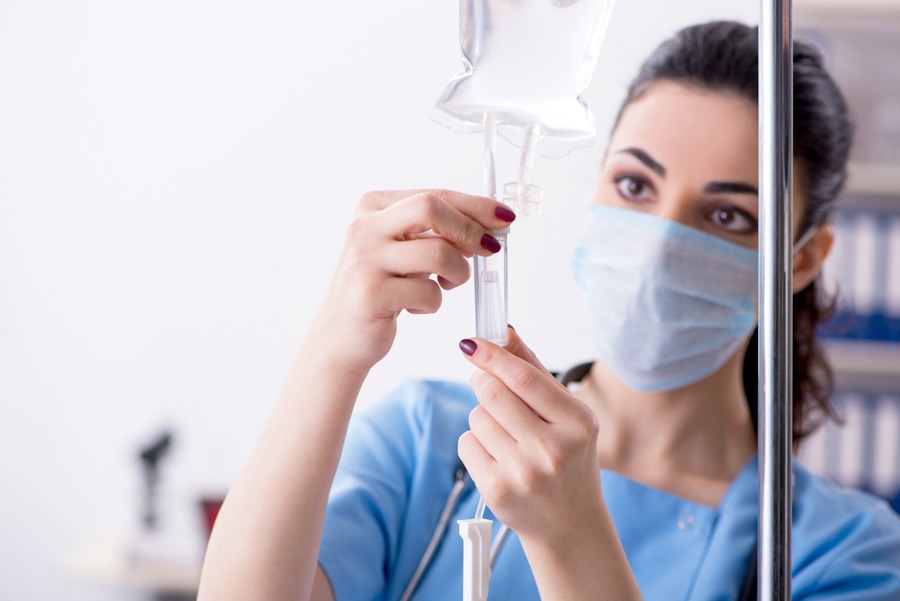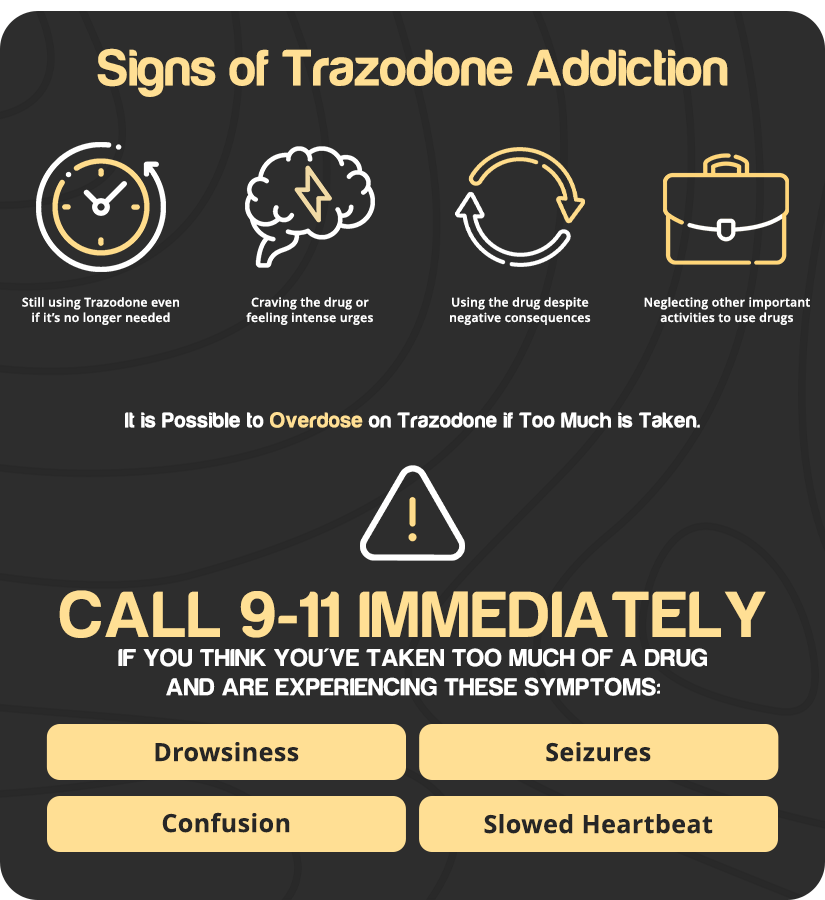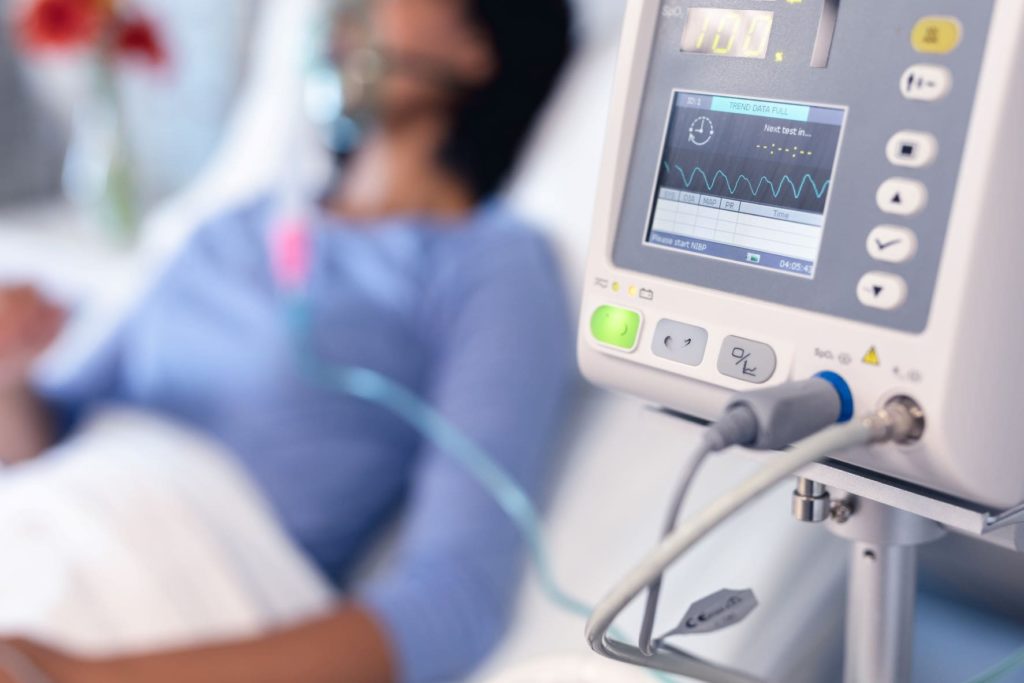DISCLAIMER: The information in this blog, including but not limited to, text, images, graphics, and other material, is for informational purposes only. This information is not to be used in the place of medical advice from your healthcare provider. Neither is this information to be used to diagnose or treat any illness or medical condition. If you are currently using Trazodone and you are concerned about the risks of overdose, please contact your medical care provider. If you believe you or someone you know is experiencing an overdose, please call your local emergency responders, as we cannot provide any assistance.
What Is Trazadone and How Is it Used?
Trazodone is an antidepressant medication that is used to treat major depressive disorders. It can also be used to treat anxiety, insomnia, and pain. Trazodone is a serotonin antagonist and reuptake inhibitor (SARI). This means that it prevents the reabsorption of serotonin, which increases the level of serotonin in the brain.
In 2019, there were a total of 23,934,214 Trazodone prescriptions. There was an estimated 5,066,449 Trazodone patients.
Trazodone is available as a generic drug and as the brand-name drugs Desyrel and Oleptro. Generic drugs usually cost less. In some cases, they may not be available in every strength or form as the brand-name versions.
How Was Trazodone Created?
Trazodone was created in the early 1960s. It was originally designed as an antipsychotic medication. However, it was found to be more effective as an antidepressant.
Trazodone is available in oral tablet form. It’s typically taken one to three times a day. Adults typically start with a trazodone dose of 150 mg daily in divided doses. This may vary, depending on your medical condition and response to treatment but seldom exceeds 400 mg/day. For children, always consult a healthcare expert for the correct dosage. Your doctor may start you on a low dose of trazodone and gradually increase your dose, not more than once every 3 or 4 days.
Clinical studies have shown trazodone to be comparable in efficacy to other drug classes, such as:
- TCAs (tricyclic antidepressants)
- SSRIs (selective serotonin reuptake inhibitors)
- SNRIs (serotonin-norepinephrine receptor inhibitors) in treating major depressive disorders.
Also, trazodone has better tolerance than second-generation SSRIs, which are highly associated with insomnia, anxiety, and sexual dysfunction
What Are the Signs of Trazodone Addiction?
Trazodone can be habit-forming. You can develop a tolerance to the drug, meaning you need higher and higher doses to get the same effect. Misusing trazodone can lead to addiction, overdose, or death.
Trazodone is a prescription medication. It’s not available over-the-counter (OTC). You should take trazodone only as directed by your doctor. Your doctor will probably start you on a low dose and increase your dose gradually.
Some signs that a person may be addicted to trazodone include:
- Taking the drug more often or in higher doses than prescribed
- Continuing to take the drug even if it’s no longer needed
- Craving the drug or feeling an intense urge to use it
- Neglecting other important activities in favor of using the drug
- Using the drug despite negative consequences, such as relationship problems or job loss
If you think you or someone you know may be addicted to trazodone, our substance abuse program in Los Angeles can help you overcome this drug use problem. We can help identify whether there’s a problem and recommend treatment options.
What Is a Drug Overdose?
A drug overdose occurs when a person takes more of a medication than their body can safely process. Overdoses can be intentional or accidental. They can also be life-threatening and require medical attention immediately. If you or a loved one is overdosing on medication or a drug, dial 9-11 immediately.
Can a Person Overdose on Trazodone?
The amount of Trazadone that is necessary to overdose depends on a number of factors, including the person’s weight, age, and health. A typical dose of Trazodone ranges from 50 to 100 mg. However, it is possible to overdose on much lower doses.
Overdosing on trazodone can lead to symptoms like dry mouth, dizziness, ataxia, nausea, hypotension, priapism, and in rare instances, seizures or serotonin syndrome. Recognizing and addressing these signs promptly is essential. Other symptoms of a Trazodone overdose can include:
- Drowsiness
- Confusion
- Seizures
- Slowed or irregular heartbeat
If you think you’ve taken too much of this drug, call your doctor or local poison control center. If your symptoms are severe, call 911 or go to the nearest emergency room immediately.
Overdosing on trazodone is more likely if you’re taking other medications that can cause drowsiness or affect your heart rhythm. These include:
- Other antidepressants
- Antihistamines
- Sedatives
- Pain relievers, and muscle relaxants
- Taking alcohol with trazodone
How Much Trazodone is Necessary to Overdose?
An overdose of trazodone can be fatal. The amount of trazodone that can lead to an overdose varies from person to person. However, taking more than 500 mg of trazodone at once can cause an overdose in most people. This is why you should always take medication as instructed by a medical professional.
How Is an Overdose Treated?
Overdoses of trazodone are treated with supportive care. This can include:
- Monitoring vital signs
- Providing oxygen
- Giving IV fluids
- Pumping the stomach (if the person has taken the medication within the last hour)
Treatment Options for Trazodone Abuse
There are many treatment options for drug addiction. Treatment can be done on an inpatient or outpatient basis, depending on the severity of the addiction. Treatment typically includes behavioral therapy, medication, and support groups. In some cases, detoxification may be necessary.
Treatment should be tailored to the individual, as every person’s experience with addiction is unique. If you or someone you know is struggling with drug addiction, there are many resources available to help.
Outpatient Treatment Program
Outpatient treatment is another option for people struggling with addiction. In outpatient treatment, the individual will typically meet with a therapist or counselor on a weekly basis.
They may also attend group meetings and participate in other activities related to their recovery. Our outpatient addiction treatment in Los Angeles can be helpful for people who are not able to commit to an inpatient program or who need more flexibility in their treatment.
Sober Living Homes
Sober living programs can be helpful for those who are transitioning from a life in treatment to life after rehab. Our California sober living homes offer refuge, support, and guidance for those who have successfully walked through the rehabilitation phase of addiction recovery.
Therapy for Substance Use Disorders
Addiction therapy services can be an important part of treatment for addiction. It can help people identify the underlying causes of their addiction and develop healthy coping mechanisms. Therapy can be done in individual, group, or family settings.
11% of U.S. adults with mental illness had no insurance coverage in 2020.11.3% of U.S. adults with serious mental illness had no insurance coverage in 2020.21% of U.S. adults experienced mental illness in 2020 (52.9 million people). This represents 1 in 5 adults.
There are many different types of therapy that can be helpful for people struggling with addiction. Some common types of therapy include cognitive behavioral therapy, Cognitive behavioral therapy (CBT) is a type of therapy that can be helpful for people struggling with addiction.
CBT can help people identify the underlying causes of their addiction and develop healthy coping mechanisms. CBT can be done in individual, group, or family settings. Other types of therapy that can be helpful for people struggling with addiction include:
- Dialectical behavior therapy
- Exposure therapy
- Family therapy
How Westwind Recovery® Can Guide You
Addiction rehab can help you get your life back on track by providing you with the tools and resources you need to recover from addiction. Our team can provide you with medical care, mental health support, and substance abuse counseling. Addiction rehab can also help you to build a support system of family and friends who can help you through your recovery.
Westwind Recovery® can help you to overcome your addiction by providing you with the tools and resources you need to recover. Westwind Recovery® can provide you with medical care, mental health support, and substance abuse counseling. WestWind Recovery can also help you to build a support system of family and friends who can help you through your recovery.
If you or someone you know is struggling with addiction, please reach out to us. We can help.

Dr. Deena is the Chief Clinical Officer of Westwind Recovery®, an award-winning outpatient treatment center in Los Angeles where she oversees the clinical and administrative program and treatment methods. Dr. Deena is a doctor of psychology and licensed clinical social worker since 1993. LCSW #20628. Originally from the East Coast, Dr. Deena has worked running treatment centers, worked as a therapist in psychiatric hospitals as well as school settings and currently has a thriving private practice in the LA area. Dr. Deena has appeared regularly on the Dr. Phil Show as an expert since 2003. She has also been featured on many other TV shows, podcasts and has contributed to written publications as well as podcasts.





